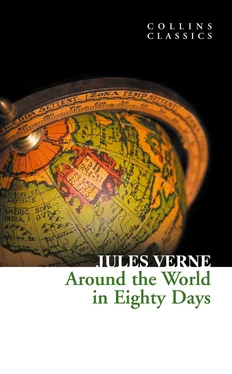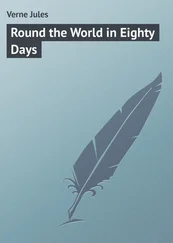Towards evening they entered the defiles of the mountains of Sutpour, which separate the territory of Khandeish from that of Bundelcund.
The next day, the 22nd of October, Passepartout, having consulted his watch, replied to a question of Sir Francis Cromarty that it was three o’clock in the morning. In fact, this famous watch, always regulated by the meridian of Greenwich, which is nearly seventy-seven degrees west, ought to be and was four hours slow.
Sir Francis then corrected the hour given by Passepartout, and added the same remark that the latter had already heard from Fix. He tried to make him understand that he ought to regulate his watch on each new meridian, and that since he was constantly going towards the east, that is, in the face of the sun, the days were shorter by as many times four minutes as he had crossed degrees. It was useless. Whether the stubborn fellow had understood the remarks of the general or not, he persisted in not putting his watch ahead, which he kept always at London time. An innocent madness at any rate, which could hurt no one.
At eight o’clock in the morning, and fifteen miles before they reached Rothal, the train stopped in the midst of an immense opening, on the edge of which were some bungalows and workmen’s huts. The conductor of the train passed along the cars calling out, “The passengers will get out here!”
Phileas Fogg looked at Sir Francis Cromarty, who appeared not to understand this stop in the midst of a forest of tamarinds and acacias. Passepartout, not less surprised, rushed on to the track and returned almost immediately, crying, “Monsieur, no more railway!”
“What do you mean?” asked Sir Francis Cromarty.
“I mean that the train goes no farther.”
The brigadier-general immediately got out of the car. Phileas Fogg, in no hurry, followed him. Both spoke to the conductor.
“Where are we?” asked Sir Francis Cromarty.
“At the hamlet of Kholby,” replied the conductor.
“We stop here?”
“Without doubt. The railway is not finished—”
“How! It is not finished?”
“No! There is still a section of fifty miles to construct between this point and Allahabad, where the track commences again.”
“But the papers have announced the opening of the entire line.”
“But, generally, the papers were mistaken.”
“And you give tickets from Bombay to Calcutta!” replied Sir Francis Cromarty, who was beginning to be excited.
“Of course,” replied the conductor; “but travellers know very well that they have to be otherwise transported from Kholby to Allahabad.”
Sir Francis Cromarty was furious. Passepartout would have willingly knocked the conductor down, who could not help himself. He did not dare look at his master.
“Sir Francis,” said Mr Fogg simply, “we will go, if you will be kind enough to see about some way of reaching Allahabad.”
“Mr Fogg, this is a delay absolutely prejudicial to your interests!”
“No, Sir Francis, it was provided for.”
“What, did you know that the railway—”
“By no means, but I knew that some obstacle or other would occur sooner or later upon my route. Now, nothing is interfered with. I have gained two days which I can afford to lose. A steamer leaves Calcutta for Hong-Kong at noon on the 25th. This is only the 23rd, and we shall arrive at Calcutta in time.”
Nothing could be said in reply to such complete certainty.
It was only too true that the finished portion of the railway stopped at this point. The newspapers are like certain watches which have a mania of getting ahead of time, and they had announced the finishing of the line prematurely. The most of the passengers knew of this break in the line, and descending from the train, they examined the vehicles of all sorts in the village, four-wheeled palkigharis, carts drawn by zebus, a sort of ox with humps, travelling cars resembling walking pagodas, palanquins, ponies, etc. Mr Fogg and Sir Francis Cromarty, after having hunted through the entire village, returned without having found anything.
“I shall go on foot,” said Mr Fogg.
Passepartout, who had then rejoined his master, made a significant grimace, looking down at his magnificent but delicate slippers. Very fortunate, he had also been hunting for something, and hesitating a little, he said:
“Monsieur, I believe I have found a means of conveyance.”
“What?”
“An elephant belonging to an Indian living a hundred steps from here.”
“Let us go to see the elephant,” replied Mr Fogg. Five minutes later, Phileas Fogg, Sir Francis Cromarty, and Passepartout arrived at a hut which was against an enclosure of high palisades. In the hut there was an Indian, and in the enclosure an elephant. Upon their demand, the Indian took Mr Fogg and his two companions into the enclosure.
They found there a half-tamed animal, which his owner was raising, not to hire out, but as a beast of combat. To this end he had commenced to modify the naturally mild character of the animal in a manner to lead him gradually to that paroxysm of rage called “mutsh” in the Hindu language, and that by feeding him for three months with sugar and butter. This treatment may not seem the proper one to obtain such a result, but it is none the less employed with success by their keepers.
Kiouni, the animal’s name, could, like all his fellows, go rapidly on a long march, and in default of other conveyance, Phileas Fogg determined to employ him. But elephants are very expensive in India, where they are beginning to get scarce. The males, which alone are fit for circus feats, are very much sought for. These animals are rarely reproduced when they are reduced to the tame state, so that they can be obtained only by hunting. So they are the object of extreme care, and when Mr Fogg asked the Indian if he would hire him his elephant he flatly refused.
Fogg persisted, and offered an excessive price for the animal, ten pounds per hour. Refused. Twenty pounds. Still refused. Forty pounds. Refused again. Passepartout jumped at every advance in price. But the Indian would not be tempted. The sum was a handsome one, however. Admitting the elephant to be employed fifteen hours to reach Allahabad, it was six hundred pounds earned for his owner.
Phileas Fogg, without being at all excited, proposed then to the Indian to buy his animal, and offered him at first one thousand pounds. The Indian would not sell! Perhaps the rogue scented a large transaction.
Sir Francis Cromarty took Mr Fogg aside and begged him to reflect before going further. Phileas Fogg replied to his companion that he was not in the habit of acting without reflection, that a bet of twenty thousand pounds was at stake, that this elephant was necessary to him, and that, should he pay twenty times his value, he would have this elephant.
Mr Fogg went again for the Indian, whose small eyes, lit up with greed, showed that with him it was only a question of price. Phileas Fogg offered successively twelve hundred, fifteen hundred, eighteen hundred, and finally two thousand pounds. Passepartout, so rosy ordinarily, was pale with emotion.
At two thousand pounds the Indian gave up.
“By my slippers,” cried Passepartout, “here is a magnificent price for elephant meat!”
The business concluded, all that was necessary was to find a guide. That was easier. A young Parsee, with an intelligent face, offered his services. Mr Fogg accepted him, and offered him a large reward to sharpen his wits. The elephant was brought out and equipped without delay. The Parsee understood perfectly the business of “mahout,” or elephant-driver. He covered with a sort of saddle cloth the back of the elephant, and put on each flank two kinds of rather uncomfortable howdahs.
Phileas Fogg paid the Indian in bank-notes taken from the famous carpet bag. It seemed as if they were taken from Passepartout’s very vitals. Then Mr Fogg offered to Sir Francis Cromarty to convey him to Allahabad. The general accepted; one passenger more was not enough to tire this enormous animal. Some provisions were bought at Kholby. Sir Francis Cromarty took a seat in one of the howdahs, Phileas Fogg in the other. Passepartout got astride the animal, between his master and the brigadier-general. The Parsee perched upon the elephant’s neck, and at nine o’clock the animal, leaving the village, penetrated the thick forest of palm trees.
Читать дальше












